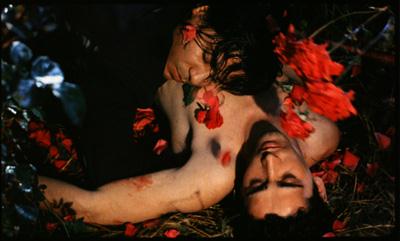
The Rose King is "one of the most beautiful and moving films in the history of gay cinema," says James Quandt, senior programmer at TIFF.
The Toronto premiere of Werner Schroeter’s The Rose King is something of a legend in film circles. When TIFF senior programmer James Quandt first presented the German auteur’s controversial work at Harbourfront Centre in 1988, a woman stumbled out of the cinema mid-film, puked all over herself and promptly passed out.
“It’s a very extreme and exquisite film, with imagery that manages to be both sublime and sickening,” Quandt says. “Over the top doesn’t begin to describe it. But it’s also one of the most beautiful and moving films in the history of gay cinema and the most explicitly homoerotic of all his films. It’s never been released on video, so it’s a very rare chance for audiences here to see it.”
“The interesting thing about Schroeter is that he is one of the gayest filmmakers I have ever seen,” says Noah Cowan, artistic director at TIFF Bell Lightbox, in a video interview with Xtra. “A gay identity — a kind of queer identity of a particular kind — looms large in his movies.”
Released in 1986 as Der Rosenkönig, the film lacks a clear narrative structure, functioning instead like a cinematic poem for three characters: Albert (Mostéfa Djadjam), a gardener trying to cultivate the perfect rose, his watchful and disapproving mother Anna (Magdalena Montezuma), and hunky youth Fernando (Antonio Orlando), whom Albert imprisons in their barn when he catches him stealing alms from the chapel on his property. At times confusing and frequently unsettling, the film weaves violence, sexuality and religious iconography into a blood-soaked voyage of art-house erotica.
Quandt first saw it at the Montreal World Film Festival the year it was released and became an instant fan.
“It was the first film of his I saw, and it turned me into an instant obsessive,” he says. “Though I knew the vaunted reputation of his previous work, there were no opportunities to see his films in Toronto. For me, it is a summation of all of his cinema because it includes all of his obsessions — homosexuality, opera, the gothic and romantic, and some of his most astonishing imagery.”
Despite never achieving the recognition of his contemporaries Wim Wenders, Werner Herzog and Rainer Werner Fassbinder, Schroeter made more than 40 films during his lifetime, leaving an indelible mark on the world of cinema when he died in 2010 at age 65. Born in Georgentahl, Germany, near the end of the Second World War, he spent much of his childhood travelling Europe with his parents. He was openly gay early in life and left school for a brief career in prostitution. His flowing blond hair and willowy frame made him an easy sell with closeted husbands and fathers.
Though he had relationships with men, including filmmaker and activist Rosa von Praunheim (director of the seminal AIDS activism film Silence=Death), Schroeter always favoured sex over commitment.
“He was driven by an aesthete’s avidity for giving and getting beauty and by a desire for affection,” Quandt says. “He claimed he was incapable of loving and became a filmmaker to participate in a social act of co-creation to make friends.”
The Rose King
Part of Magnificent Obsession: The Films of Werner Schroeter
Thurs, Nov 8, 6:30pm
$12
The program continues until Sun, Dec 9
TIFF Bell Lightbox
350 King St W
Tickets available at 416-599-TIFF or tiff.net


 Why you can trust Xtra
Why you can trust Xtra


